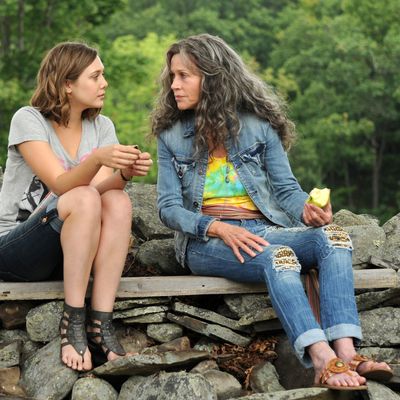
Strange as it may seem, Jane Fonda never really played a hippie. Her specialties were fragile wives (usually of the bourgeois variety), motor-mouth journalists, and sassy prostitutes. But it comes as little surprise that sheÔÇÖd show up as an aging flower-child in the family comedy Peace, Love, & Misunderstanding ÔÇö maybe because we have and will always identify her with the counterculture, thanks to her controversial involvement with the Vietnam War protests. And it also comes as little surprise that she knocks the part out of the park, even if the film around her leaves something to be desired.
The story is your standard-issue multi-generational romantic comedy. Catherine Keener plays conservative, uptight city lawyer Diane (the kind of role Fonda herself might have done in her youth); after her husband (Kyle MacLachlan) announces he wants a divorce, she takes her two teenage kids ÔÇö nerdy wannabe-filmmaker Jake (Nat Wolff) and vegetarian feminist Zoe (Elizabeth Olsen)┬áÔÇö up to Woodstock to hang out with her pot-growing artist mother Grace (guess who), who lives in a house with chickens wandering the halls and naked men mysteriously showing up for breakfast. Grace and Diane havenÔÇÖt seen each other for decades, and this is the kidsÔÇÖ first meeting with their free-spirited grandmother, who seems to act as a kind of earth motherÔÇôspiritual guide for the whole laid-back town, the residents of which seem to regard protesting things as more community-building session than anything else. (Grace claims that Diane was born while Jimi Hendrix shredded ÔÇ£The Star-Spangled BannerÔÇØ during his iconic set at the legendary music festival.)
The predictable turns come with rat-tat-tat efficiency: Introverted Jake meets Tara (Marissa OÔÇÖDonnell), a sweet, outgoing young protestor; strident Zoe meets Cole (Chace Crawford), a hunky young butcher, and stick-in-the-mud Diane meets Jude (Jeffrey Dean Morgan), a charmingly scruffy local artist. Of course, we know where itÔÇÖs all headed. That wouldnÔÇÖt be such a bad thing┬áÔÇö the getting there is presumably more important than the destination itself ÔÇô but Joseph Muszynski and Christina MengertÔÇÖs script is curiously inert. Plot points go nowhere; scenes just kind of fade out before theyÔÇÖve reached a conclusion.
The film was directed by Australian Bruce Beresford, an underrated director whose career has veered between the sublime (Tender Mercies, Breaker Morant, Black Robe) and the ridiculous (Driving Miss Daisy, the Sharon Stone electric-chair drama Last Dance). HeÔÇÖs a master of performance and atmosphere, but heÔÇÖs never been much of a storyteller, and Peace, Love, and Understanding plays to both his strengths and his weaknesses. He effectively imagines Woodstock as a BoomerÔÇÖs Paradise, an idyllic place filled with refugees from the counter-culture and from its later, New Age-y iterations. And when these fine actors are given a chance to actually play off each other, the effect is electric: Keener and Fonda get some lovely moments together, and Morgan has a pleasant, comforting aura around him. But the film seems lost as to how to carry these journeys along; the intercutting between characters often feels like a crutch, a method of avoidance rather than enhancement. And the inevitable obstacles to these burgeoning relationships feel artificial and inconsequential, because we ultimately spend so little time with the individual characters. By the time everybodyÔÇÖs reunited for the big finale, we may find ourselves wondering what the big deal was.


